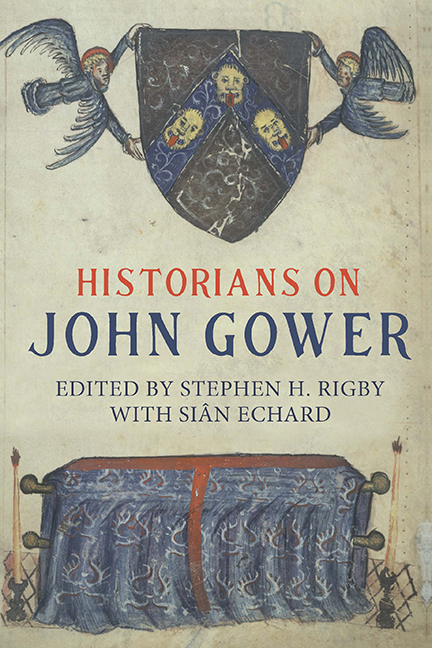Book contents
- Frontmatter
- Dedication
- Contents
- List of Illustrations
- Notes on Editors and Contributors
- Acknowledgements
- List of Abbreviations
- A Note on the References
- Preface: Gower in Context
- PART I Gower’s Life and Works
- PART II GOWER AND LAY SOCIETY
- PART III GOWER AND THE CHURCH
- PART IV GOWER AND GENDER
- PART V GOWER AND POLITICS
- PART VI GOWER AND COSMOGRAPHY
- Select Bibliography
- Index
- VOLUMES ALREADY PUBLISHED
4 - The Peasants and the Great Revolt
Published online by Cambridge University Press: 26 May 2022
- Frontmatter
- Dedication
- Contents
- List of Illustrations
- Notes on Editors and Contributors
- Acknowledgements
- List of Abbreviations
- A Note on the References
- Preface: Gower in Context
- PART I Gower’s Life and Works
- PART II GOWER AND LAY SOCIETY
- PART III GOWER AND THE CHURCH
- PART IV GOWER AND GENDER
- PART V GOWER AND POLITICS
- PART VI GOWER AND COSMOGRAPHY
- Select Bibliography
- Index
- VOLUMES ALREADY PUBLISHED
Summary
Gower the Conservative
For modern readers, John Gower is likely to appear as a thinker who was ‘conservative’ in his outlook, being rigidly elitist in his views and relentlessly condemnatory to those whom he saw as challenging the existing social hierarchy. Barrie Dobson, for instance, awarded him ‘the title of Jeremiah of late fourteenth-century England’ and bemoaned his ‘monotonous, heavy-handed and extremely pessimistic approach to his theme’. If Gower's reputation is justified then it owes a good deal to his treatment of peasants in general and to his response to their participation in the Great Revolt of 1381 in particular, where he portrays the rebels as vicious animals who are without reason or merit. Gower was writing during a period of tumultuous change in English society and economy, following successive devastating outbreaks of plague after 1348. Here we set out the reality of the changes which English society underwent during this period and examine the intellectual framework that Gower employed to make sense of them. The abundance of central government and local sources which has survived from this period has allowed historians in recent years to recover a great deal about the lives of the lowest ranks of society, to reassess the changes after the Black Death and to re-interpret the causes of the Great Revolt. It will be argued here that fundamental changes to the labour market shook the ideological and moral framework of society, and that the attempts of the ruling elite to make sense of what was happening – and their inability to prevent it – informed the development of a poetic common voice in Ricardian England. The historical evidence indicates that Gower was not only a conservative thinker but was backwards looking even by the standards of his own day.
The Peasants and the Third Estate
Of the estimated 2.8m people in England in the 1370s, the overwhelming majority – perhaps 85% or more – belonged to what contemporary social commentators defined as the third estate, the laboratores whose ordained role was to provide food, clothing and shelter through manual labour for the other two estates: the oratores, who prayed for society and sought to bring it salvation, and the bellatores, whose task was to provide physical protection and justice.
- Type
- Chapter
- Information
- Historians on John Gower , pp. 167 - 190Publisher: Boydell & BrewerPrint publication year: 2019

